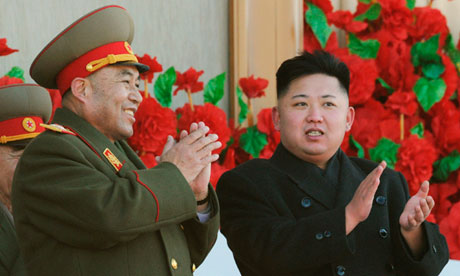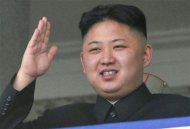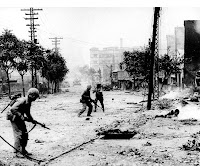How the Kim's Survive by Gordon Chang
The Democratic People’s Republic of Korea is a destitute and reviled
state, yet it endures. Despite periodic foreign predictions of imminent
collapse, the Kim family regime manages to carry on from one year to the
next.
How can the world’s worst government continue to exist for more than
six decades? The standard explanation has been that its rulers, three
generations of the Kim family, have been able to wall off their society.
As a result of the isolation, Kim Il Sung, who founded the miserable
state, was then able to convince his subjects that he had mystical
powers.
By Kwanwoo Jun
When Unification Minister Yu Woo-ik came up with the idea of gathering donations from the public as a way to help cover the costs of Korean reunification, he raised more eyebrows than cash.

- Kwanwoo Jun / The Wall Street Journal
- Unification Jar
That hasn’t stopped him pushing ahead with the idea, and on Thursday evening he hosted a fundraiser-cum-comedy-show in northern Seoul to kick-start the program. The centerpiece of the event was the presentation of the first of his own hand-made ceramic “unification jars.”
The audience got to chat with a famous TV comedian, Choi Hyo-jong, before dropping their own donations into the jar. One of them included a man who had collected about 4.5 million won ($3,900) in one-won coins. In contrast, a student dropped in a 1,000 won note ($0.87).
Seoul estimates reunification would cost at least 55 trillion won ($48 billion) annually in the initial stage. Mr. Yu acknowledges that donations won’t get anywhere near covering that, but stressed the need to make a start and raise awareness of the issue.
“To fill this unification jar with money even 10 times would not result in raising enough funds to cover 55 trillion won,” Mr. Yu said during the show. “But reunification will come closer if more donors line up.”
The minister said he borrowed the fund-raising idea from the practice of many elder Koreans saving grains of rice in a jar for a rainy day. He said he was also inspired by the enthusiasm shown in 1997-1998 when many Koreans lined up to donate or sell their gold jewelry to help the country overcome the Asian financial crisis.
Without an imminent sense of crisis, persuading South Koreans to stump up for reunification is a tough sell.
“Honestly, I’m not really ready to spend my own expense money for people I do not really know in the North,” Choi Jae-Hyun, a high school junior, said while watching Thursday’s show.
Last year, the minister failed to persuade parliament to enact a new law to establish a permanent fund for use during reunification. Currently, the government only runs a temporary year-long fund for inter-Korean cooperation projects. The ministry says it will seek approval for a renewal of the fund in parliament this year.
Meanwhile, North Korea continues to rail against Mr. Yu and his donations idea, which doesn’t jibe with its ambition for a unified Korea under Pyongyang’s leadership. The North’s main newspaper, Rodong Sinmun, said in a May 22 article that the unification jars would be “shattered into pieces” by a joint national struggle.
With official inter-Korean talks at a standstill, Mr. Yu’s focus is on doing what he can to move forward discussion and preparation for the eventual day when reunification comes.
“With these jars made, South Korea has begun preparations for reunification,” he said during the show.








 Choe Ryong-hae (left) and Ri Yong-ho
Choe Ryong-hae (left) and Ri Yong-ho  Ri Yong-ho
Ri Yong-ho 



 North Korean soldiers dance in the plazas of Pyongyang on
Wednesday after leader Kim Jong-un was given the title of marshal. /AP-Yonhap
North Korean soldiers dance in the plazas of Pyongyang on
Wednesday after leader Kim Jong-un was given the title of marshal. /AP-Yonhap










